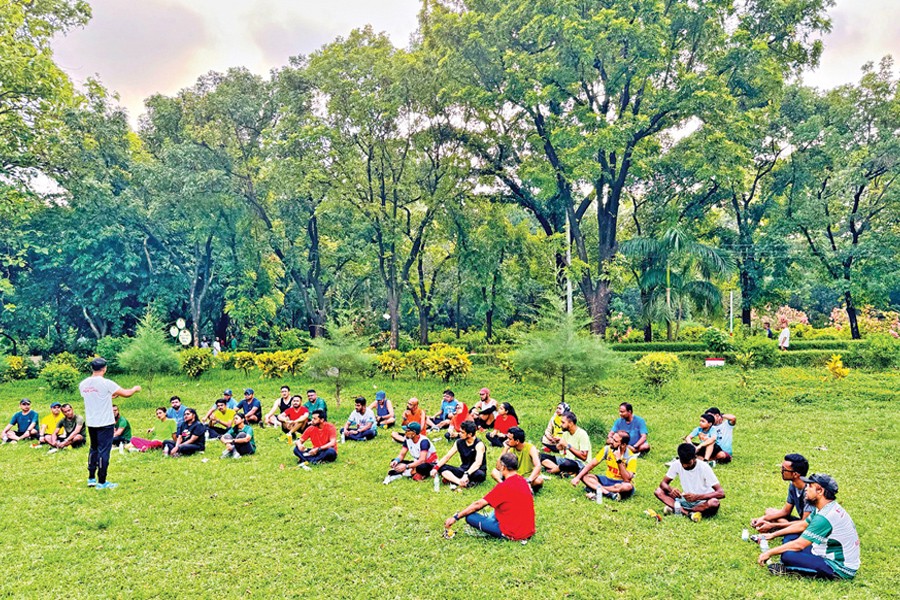
Published :
Updated :

Eid-ul-Fitr is a time for joy, celebration, and togetherness. After 30 days of fasting during Ramadan, it's only natural to look forward to indulging in delicious treats like shemai, payesh, and lavish dawats. With family visits, travel, and holidays, sticking to a fitness routine may feel like a challenge. However, staying fit during Eid doesn't require giving up on the celebrations-it's about making smart choices which allow you to enjoy the occasion while maintaining balance.
If you're seeking practical ways to balance fitness and festivities, here are a few tips that can help you enjoy Eid without feeling sluggish or guilty afterward.
First, it's important to plan your meals without feeling restricted. Eid feasts are meant to be enjoyed, but instead of overloading on carbs and fried foods, being mindful of your choices can help. Prioritise protein and fiber, such as lean meats, fish, lentils, and plenty of vegetables, as these help keep you fuller for longer and reduce mindless snacking. Sweets, like shemai and payesh, are an essential part of the celebration, so enjoy them, but don't overdo it. You can balance this by not loading up on sugar throughout the day. Using smaller plates is a simple yet effective trick to avoid overeating while still feeling satisfied. Also, staying hydrated is key-water aids digestion and controls appetite, so opt for water, coconut water, or green tea over sugary soft drinks.
Second, find ways to stay active without missing out on the fun. With family visits, Eid prayers, and festive gatherings, it's easy to fall off track, but staying active doesn't have to feel like a burden. Start your day with some movement-whether it's a quick bodyweight workout, stretching, or a morning walk, setting a positive tone early in the day can make a difference. Take movement breaks when possible, like taking short walks after meals, or if you're traveling, try to avoid sitting for extended periods. Walking for just 10-15 minutes after meals can improve digestion and help prevent post-meal sluggishness. Engage in activities like playing with kids, backyard sports, or anything that keeps you moving without feeling like exercise.
Avoiding overeating is also crucial. After a month of fasting, your body may crave more food, but overeating can leave you feeling bloated and drained. Eat slowly and mindfully, savouring each bite, rather than rushing through your meals. Skipping meals to "save space" for a feast often leads to overeating later, so try not to skip any meals. Instead of filling your plate with everything, choose a few of your favourite dishes and enjoy them in moderation.
Making smarter food choices is another way to stay on track without feeling deprived. You don't have to avoid Eid delicacies, but you can enjoy them in a way that supports your health. Opt for grilled or curry meats instead of deep-fried options, and choose homemade sweets with less sugar instead of store-bought ones packed with preservatives. Using healthy fats like olive oil, mustard oil, or ghee in moderation is a better alternative to excessive vegetable oils. Prioritise proteins and vegetables on your plate before indulging in heavier dishes.
Staying active during travel is important too. If you're heading to your ancestral home or going on a trip, don't let it disrupt your routine. Walk as much as possible-whether you're sightseeing or visiting family. Bodyweight exercises like squats, push-ups, and stretches can be done anywhere without the need for a gym. Make walking a fun activity by playing outdoor games with family or exploring new places on foot. It's also helpful to pack healthy snacks such as nuts, fruit, or protein-packed laddus to avoid relying on unhealthy options during your travels.
Sleep is another factor that affects your overall health, so be mindful of your sleep schedule during Eid. Late-night gatherings and endless cups of tea are a part of the celebrations, but poor sleep can lead to fatigue and cravings. Stick to a reasonable bedtime, even if it's later than usual, and avoid heavy meals right before bed to prevent digestive discomfort. Limiting caffeine and sugary drinks in the evening can help you achieve restful sleep.
Finally, once the festivities have wound down, don't stress about a ‘detox’. Instead, focus on a healthy post-Eid recovery. Hydrate well, as water helps flush out excess sodium and reduces bloating. Ease back into your workout routine, even if it's light activity at first. Eating nutrient-dense meals will help you fuel your body properly and get back on track.
Eid-ul-Fitr is a time for celebration, connection, and gratitude. Staying fit doesn't mean missing out on the fun-it's about making mindful choices. You can enjoy your favourite foods and still feel great by the end of the holidays. Fitness is about sustainability, not restriction. By keeping things balanced and staying active in ways that feel natural, you'll maintain your health without needing to "get back on track" after Eid.
Celebrate Eid fully, savour the moments, the food, and the joy, all while keeping your health in check. Your future self will thank you. Eid Mubarak!
Md Abdul Mukit is a lifestyle coach and the founder of Shustho.
mukit.shustho@gmail.com


 For all latest news, follow The Financial Express Google News channel.
For all latest news, follow The Financial Express Google News channel.